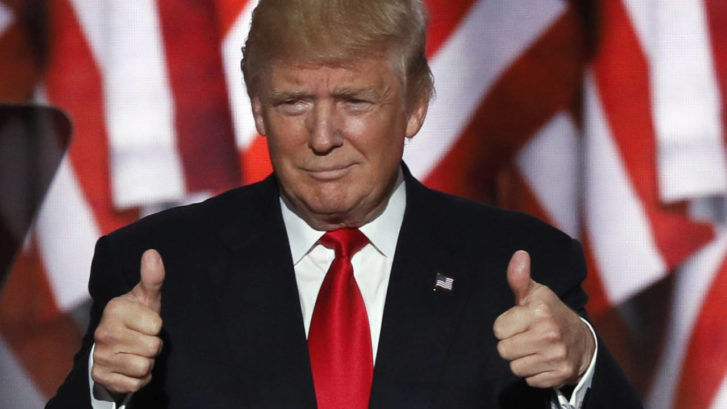Trump Wins
Donald J Trump has completed his landmark quest and will become the nation’s 45th president after a contentious and divisive campaign. In addition, the Republican Party has retained control of both houses of Congress. This outcome marks a significant reversal from just a few weeks ago when a Hillary Clinton presidency was highly probably and even a Democratic Party sweep of Congress was being considered.
While this outcome is certainly a shock to many, it is important to remember that the result isn’t a surprise to the plurality of American voters that spoke their collective will at the ballot boxes. The strength of a democracy is not in whether we like the outcome, but rather in how we accept the result as the voice and will of our republic.
Despite many things being promised on the campaign trail, all newly elected Presidents enter with a constrained ability to enact their agenda unilaterally. As a result, immediate and sweeping political changes are a process, which gives markets and the American public time to digest and react. Although often derided by partisans, the inability of a President to swiftly change policies is a strength of our political system, not a weakness of it.
Moreover, the current market volatility is not because Trump was elected President, as markets do not have political affiliations. Rather, it reflects the market’s adjustment to a surprise presidential winner and the market’s tentativeness regarding the vast uncertainty over which of President-elect Trump’s stated policies he will be able to enact. Which Matt and Jeremy had articulated in meetings over the months leading into last night’s election. The first major step towards clarity will come with Trump’s choices for key administration officials; his selections will give a better sense of the priorities for the Trump administration. This should provide some path to further understanding and potentially calm the markets.
For the first time in 10 years, the Republican Party has control of the Presidency and both houses of congress. The Democratic Party did control all three from 2008-2010, however, this is the first time
since the first two years of President George W Bush’s second term that the Republican party has control. As in all things, this may solve some problems, and perhaps exacerbate others. For example, potentially divisive upcoming issue, such as the necessary expansion of the debt ceiling and reforms to corporate tax code, could be easier to navigate. There is a common perception that the markets live a divided government. While it is not necessarily true at every point in history, it is the most common result of a “one-sided government.”
Most importantly, however, over time we have witnessed corporations and financial markets adapting smoothly to new political environments. It’s just a matter of time. The uncertainty surrounding the Trump presidency could be greater than a typical transition; therefore, the markets may take additional time to process any changes. However, the uncertainty itself is not unusual.
Separating political views and emotions from investment decisions is difficult. Whether this election result was your favored outcome or not, what we have learned over the years is that although Presidents can set an overall tone for the markets, over the long term, it is the underlying fundamental of the economy and the strength of corporate profits that matter more. Overall, as wealth managers, we continue to be hesitant by the underlying fundamentals in the economy being conflicting. Coupling that with the related resilience of the stock market. Recently, encouraging economic data, including a record 73 consecutive months of private sector jobs growth, higher consumer confidence, and an increase in manufacturing activity, al suggest an economic recession in the next year is unlikely (U.S. Bureau of Labor and Statistics 11/7/16). Although the S&P500 is up 2% year to date (as of market close 11/4/16), it is basically flat over the past three months and only up ½% over roughly the last 18 months (July 10, 2015 it was 2076; Nov 4, 2016 it was 2085.
The ability to shift through economic and market data when conflicted is where we pride ourselves at Maverick Wealth Management. For example, the lowest workforce participation rate in 38 years is where we find the “state of the economy,” however, the unemployment rate recently hit an 8 year low. These two statistics dramatically contradict themselves, thus allowing many people to misunderstand economic data. The Federal Reserve Bank remains ready to react. However, we must acknowledge they have almost no room to reduce rates if need be. Currently, we are sitting at the 89th month into this bull market, the 3rd longest in U.S. history (www.wallstreetjournal.com) and quickly closing in on the 2nd longest bull market. Most professionals, while they may disagree on when things turn, do agree that we are towards the tail-end of this current bull market.
As this historic cycle comes to a close, we suggest casting a “vote for your advisor.” Be present with your advisor (show up for meetings quarterly), be proactive with your asset management (don’t only “buy and hold”) and be open to perspective. While uncertainty will certainly be prevalent over the short-term, our political and economic systems are resilient and can, after a period of adjustment, adapt to new realities. As investors, we all need to try to put this election into perspective, as our investment horizons extend far beyond yesterday’s votes or any political cycle.
The opinions voiced in this material are for general information only and are not intended to provide specific advice or recommendations for any individual. All performance referenced is historical and is no guarantee of future results. All indices are unmanaged and may not be invested into directly





